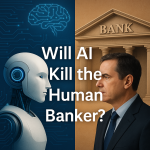We’re at a fascinating crossroads in the evolution of banking. Artificial intelligence (AI), once considered futuristic, is now deeply embedded in our financial systems—from fraud detection to customer service chatbots, risk assessments to algorithmic trading. As AI takes on increasingly complex tasks, one looming question divides the industry:
Will AI eventually replace the human banker? Or is there a future where both coexist?
Banks around the world are investing billions into AI-powered systems. According to a McKinsey report, AI could generate up to $1 trillion annually for the global banking industry. This includes cost savings from automation, new product innovations, and improved decision-making using data analytics.
Some notable real-world examples:
While AI is impressive, there are still crucial areas where human bankers shine:
Routine and rule-based jobs—like data entry, KYC verifications, and basic customer service—are already being automated. Entry-level roles are shrinking, and mid-tier operations jobs are being replaced by algorithms. This is a global trend, not just limited to big banks or developed countries.
India alone could lose up to 30% of traditional banking roles over the next decade, according to NASSCOM. So where does that leave aspiring professionals?
The winners in this transition will be those who blend financial knowledge with tech fluency. Roles like:
Instead of resisting change, banking professionals need to upskill—learn Python, data visualization, AI basics, cybersecurity, and behavioral finance.
I believe that AI will redefine, not erase, the role of human bankers. The profession won’t die—it will evolve. Those who embrace tech and focus on human-centered skills (empathy, ethics, creativity) will become even more valuable.
But I also see a danger: If we automate too fast and too blindly, we may create a cold, impersonal banking system where trust erodes.
What do you think?
Will AI eventually replace the human banker? Or is there a future where both coexist?
The Rise of AI in Banking
Banks around the world are investing billions into AI-powered systems. According to a McKinsey report, AI could generate up to $1 trillion annually for the global banking industry. This includes cost savings from automation, new product innovations, and improved decision-making using data analytics.
Some notable real-world examples:
- JP Morgan’s COIN: This AI platform reviews legal documents and extracts key data in seconds, saving thousands of lawyer hours.
- HSBC: Uses AI for anti-money laundering (AML) processes, drastically improving detection accuracy.
- HDFC Bank in India: Deployed Eva, an AI chatbot that handles millions of customer queries with near-human accuracy.
Where Humans Still Have the Edge
While AI is impressive, there are still crucial areas where human bankers shine:
- Relationship Management: High-net-worth individuals, SMEs, and corporate clients still prefer personal relationships.
- Complex Decision Making: Lending for startups, mergers, or distressed companies often requires human judgment, empathy, and nuance that AI lacks.
- Trust & Ethics: AI is a tool, but trust is a human feeling. People want to talk to a real person when discussing sensitive issues like debt, investments, or financial crises.
But Let’s Not Sugarcoat It: Some Jobs
Routine and rule-based jobs—like data entry, KYC verifications, and basic customer service—are already being automated. Entry-level roles are shrinking, and mid-tier operations jobs are being replaced by algorithms. This is a global trend, not just limited to big banks or developed countries.
India alone could lose up to 30% of traditional banking roles over the next decade, according to NASSCOM. So where does that leave aspiring professionals?
Adaptability: The New Financial Skill
The winners in this transition will be those who blend financial knowledge with tech fluency. Roles like:
- AI ethics auditors
- Financial data analysts
- Human-AI interaction designers
- Digital financial advisors
Instead of resisting change, banking professionals need to upskill—learn Python, data visualization, AI basics, cybersecurity, and behavioral finance.
My Take (Let’s Discuss!)
I believe that AI will redefine, not erase, the role of human bankers. The profession won’t die—it will evolve. Those who embrace tech and focus on human-centered skills (empathy, ethics, creativity) will become even more valuable.
But I also see a danger: If we automate too fast and too blindly, we may create a cold, impersonal banking system where trust erodes.
What do you think?
- Is your bank already using AI tools?
- Do you worry about job security or see this as an opportunity?
- How should universities and MBA programs prepare future bankers?

